Four ministers sacked by Libya's unity government
Four ministers in the UN-backed Libyan unity government have been sacked, the Government of National Accord [GNA] confirmed Friday.
Their departure - just three months after the GNA set up office in the capital Tripoli - is a new setback in efforts to unify the North African country which has a rival administration in the east.
"The dismissed ministers were absent from their work and refused to take up their duties in the Government of National Unity... for over 30 days," the GNA said in a statement on its website.
The justice, economy and industry, finance and national reconciliation ministers - all from eastern Libya - were dismissed from their posts on Thursday, it added.
That is three months to the day since Prime Minister Fayez al-Sarraj, a businessman from Tripoli, sailed into the capital under naval escort.
Mohamed Eljarh, a Libya expert with the Atlantic Council think tank, said the sackings were a sign of the GNA's failure to win support in the east of the country.
"I believe that the fact that they are from the east is significant... The situation for the GNA in the east is that of rejection, no confidence, no trust," he said.
The GNA, the result of a UN-backed power-sharing agreement in December, took control of several ministries in April.
But it has yet to receive a vote of confidence from the country's elected parliament in the eastern city of Tobruk that would give it authority over the whole country.
In March, just over half of the parliament's members signed a statement of support for the GNA, but a formal vote of confidence has been repeatedly delayed.
Sarraj named a cabinet of 18 ministers in February.
He gave several important portfolios to easterners - including Colonel Al-Mahdi al-Barghathi, a popular military figure who is defence minister.
The GNA faces a fearsome set of military, economic and political challenges in a country that has faced chaos since the overthrow of dictator Muammar Gaddafi in 2011.
GNA-allied forces have been fighting the Islamic State group in its stronghold of Sirte for the past seven weeks.
Libya's oil-dependent economy has also been hit hard by the sharp fall in world prices.
Agencies contributed to this report.





 Follow the Middle East's top stories in English at The New Arab on Google News
Follow the Middle East's top stories in English at The New Arab on Google News
![The UAE is widely suspected of arming the RSF militia [Getty]](/sites/default/files/styles/image_330x185/public/2024-11/GettyImages-472529908.jpg?h=69f2b9d0&itok=Yauw3YTG)
![Netanyahu furiously denounced the ICC [Getty]](/sites/default/files/styles/image_330x185/public/2024-11/GettyImages-2169352575.jpg?h=199d8c1f&itok=-vRiruf5)
![Both Hamas and the Palestinian Authority welcomed the ICC arrest warrants [Getty]](/sites/default/files/styles/image_330x185/public/2024-11/GettyImages-2178351173.jpg?h=199d8c1f&itok=TV858iVg)